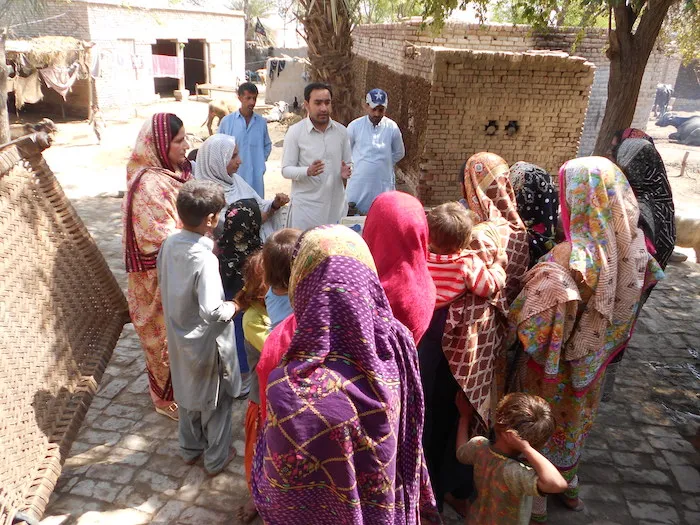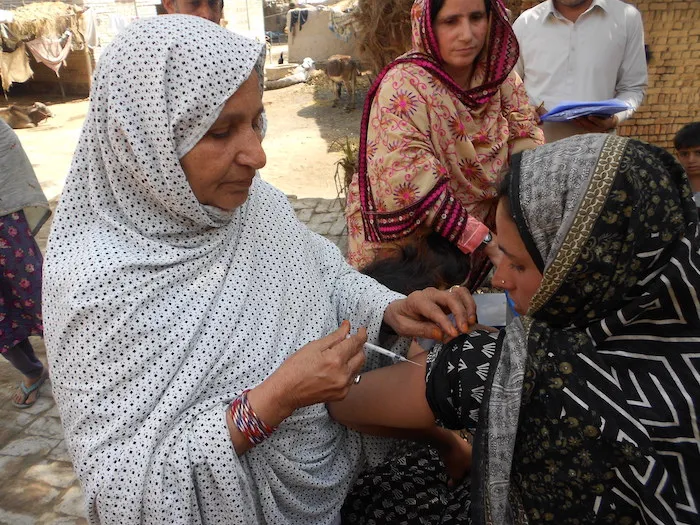Going the Distance to Eliminate MNT with Female Health Workers
Every 21 minutes, a newborn baby dies from tetanus. Typically contracted through unhygienic childbirth and umbilical cord care practices, the disease affects mothers and newborns in some of the poorest, hardest-to-reach populations in the world.
Newborns infected by tetanus during or after delivery suffer an agonizing death
Tetanus is acquired by exposure to the spores of the bacterium Clostridium tetani, commonly found in dirt. Mothers who have not been immunized against tetanus and who give birth outside hygienic health facilities are most at risk. Infants infected during or just after delivery suffer an agonizing death.
The good news is that tetanus is surprisingly easy to prevent through immunization and hygienic birth practices. A series of three shots provides immunity to a woman, who automatically passes on that immunity to her future children.
Since 1999, UNICEF and partners have been working to eliminate maternal and neonatal tetanus (MNT) worldwide, vaccinating 154 million women in 53 countries. MNT has been eliminated in 47 countries to date, leaving just 12 at risk: Afghanistan, Angola, the Central African Republic (CAR), Guinea, Mali, Nigeria, Pakistan, Papua New Guinea, Somalia, Sudan, South Sudan and Yemen.
From 2015 - 2019, UNICEF Canada, the Government of Canada and Kiwanis Foundation of Canada helped vaccinate over 9.6 million women and girls in Pakistan, Chad, Kenya, South Sudan, and Sudan against tetanus. Additionally, over 46,000 health workers—more than half of them women— were trained to deliver essential services for women and children, thanks to Canadian funds.
Saving Lives in Pakistan

In Pakistan, health workers travel long distances to educate families living in remote villages about the lifesaving benefits of immunization.
Jameela, a health worker in Pakistan's Kambar District, says the work is difficult but rewarding. "I feel blessed to have served my community for so many years. Though there are many challenges facing my region, it is fulfilling to provide safe, effective and typically inaccessible vaccines to women and children."
For women in rural Pakistan, it's a struggle to reach vaccination centers. "Ranwati County has about 52 villages and 41,000 people," explains Jameela. "The village of Peer Jo Goth is far from any health facilities, and the community is reluctant to travel to outside areas for health services. This has created great limitations to our community's access to vaccines."
A Warm Welcome

To provide tetanus vaccinations to all women of reproductive age in Kambar District, a team of female health workers developed a special outreach campaign. They organized all pre-campaign preparation, microplanning and community engagement activities, and encouraged communities to attend the outreach sites.
Although some communities seemed hesitant about being vaccinated, the local health workers were welcomed in many villages.
Local health workers build trust in the community and share information about how immunization saves lives
"Once the campaign began, we would start before dawn to prepare for the new challenges of the day," says Shamul, one of the health workers. "We would begin by attending an orientation and briefing on the needs and barriers to vaccination in that village. Then we were given tally sheets, vaccines and other supplies. There are many challenges and hurdles at the community level.
"As a female health worker, there was often no safe routes for me to take to reach some of the communities. But despite this, we reached every one and were received with warm welcomes, where families would serve us traditional refreshments. It was through these interactions that we were able to develop relationships with the local families, creating a bridge between our many communities."
Eliminating MNT
In order to successfully eliminate MNT, a country must certify that there is less than 1 death from neonatal tetanus per 1,000 babies born in every district of the country. Pakistan's Punjab Province, home to more than 50 percent of the population, has already declared elimination. Sindh Province is likely to be the next to achieve elimination status.
"After witnessing many cases of neonatal tetanus and seeing how terrible this disease is, I am so concerned for those who are not yet vaccinated," says Shamul. "I feel responsible to provide basic services to our entire community. I register every pregnant woman and tell each one the importance of prenatal care and tetanus immunizations. I also provide tetanus vaccinations for all women of reproductive age, not just the pregnant women, so that we can save our women and children from this killer disease."
In addition to preventing newborns from dying from MNT, UNICEF trained community health workers like Shamul are now also better equipped to play a front-line role in future COVID-19 immunization campaigns and ensure essential immunization continues during the pandemic.
